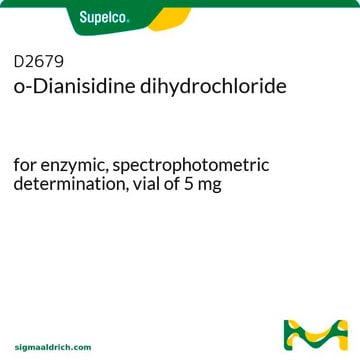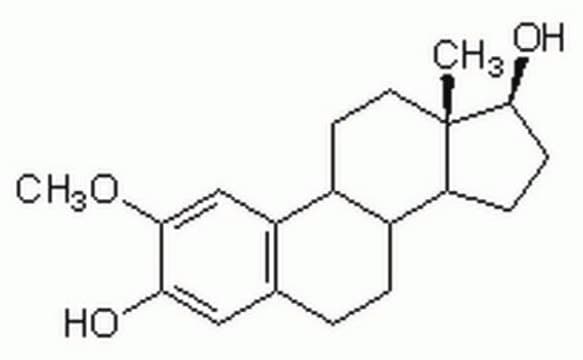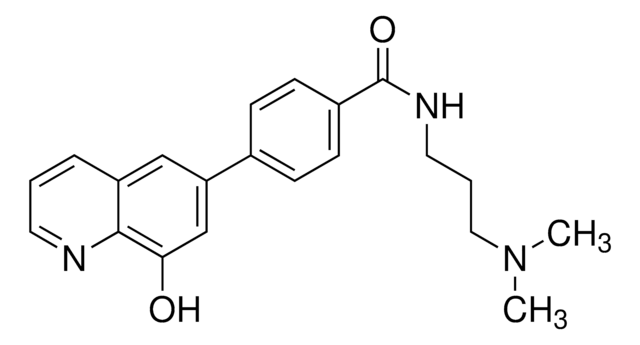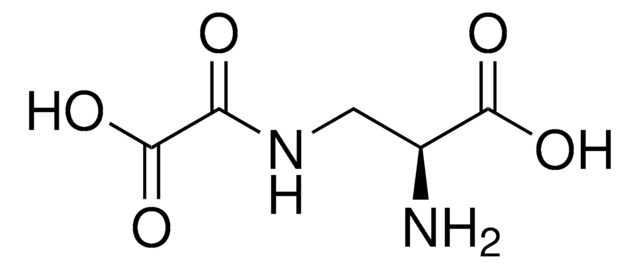D3695
DMOG
≥98% (HPLC), powder, HIF-hydroxylase inhibitor
Sinónimos:
Dimethyloxalylglycine, N-(Methoxyoxoacetyl)-glycine methyl ester
About This Item
Productos recomendados
product name
DMOG, ≥98% (HPLC)
Quality Level
assay
≥98% (HPLC)
form
powder
color
white to off-white
solubility
H2O: >30 mg/mL
shipped in
wet ice
storage temp.
−20°C
SMILES string
COC(=O)CNC(=O)C(=O)OC
InChI
1S/C6H9NO5/c1-11-4(8)3-7-5(9)6(10)12-2/h3H2,1-2H3,(H,7,9)
InChI key
BNJOZDZCRHCODO-UHFFFAOYSA-N
Application
- in hypoxia-inducible factor (HIF) activity assay
- to examine its effects on the degradation of HIF-1α and renal regeneration
- in DMOG preconditioning of adipose tissues
- as vehicle control for the primary liquid culture of CD34+ cells
- for endothelial cell stimulation
Biochem/physiol Actions
Features and Benefits
signalword
Warning
hcodes
Hazard Classifications
Acute Tox. 4 Oral
Storage Class
11 - Combustible Solids
wgk_germany
WGK 3
flash_point_f
Not applicable
flash_point_c
Not applicable
Certificados de análisis (COA)
Busque Certificados de análisis (COA) introduciendo el número de lote del producto. Los números de lote se encuentran en la etiqueta del producto después de las palabras «Lot» o «Batch»
¿Ya tiene este producto?
Encuentre la documentación para los productos que ha comprado recientemente en la Biblioteca de documentos.
Los clientes también vieron
Artículos
We offer a variety of small molecule research tools, such as transcription factor modulators, inhibitors of chromatin modifying enzymes, and agonists/antagonists for target identification and validation in gene regulation research; a selection of these research tools is shown below.
We offer a variety of small molecule research tools, such as transcription factor modulators, inhibitors of chromatin modifying enzymes, and agonists/antagonists for target identification and validation in gene regulation research; a selection of these research tools is shown below.
We offer a variety of small molecule research tools, such as transcription factor modulators, inhibitors of chromatin modifying enzymes, and agonists/antagonists for target identification and validation in gene regulation research; a selection of these research tools is shown below.
We offer a variety of small molecule research tools, such as transcription factor modulators, inhibitors of chromatin modifying enzymes, and agonists/antagonists for target identification and validation in gene regulation research; a selection of these research tools is shown below.
Nuestro equipo de científicos tiene experiencia en todas las áreas de investigación: Ciencias de la vida, Ciencia de los materiales, Síntesis química, Cromatografía, Analítica y muchas otras.
Póngase en contacto con el Servicio técnico


















